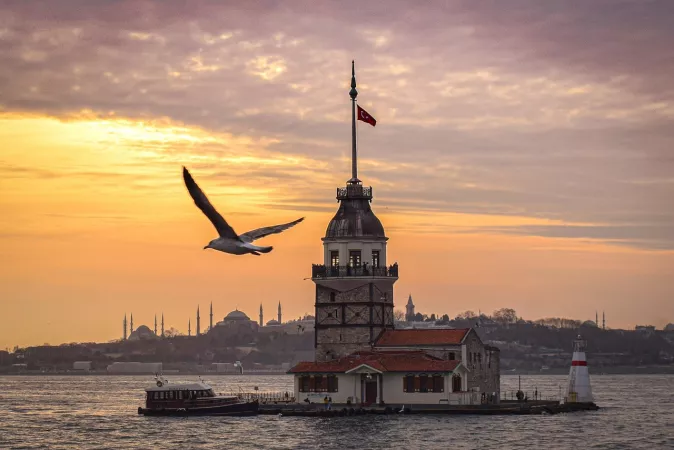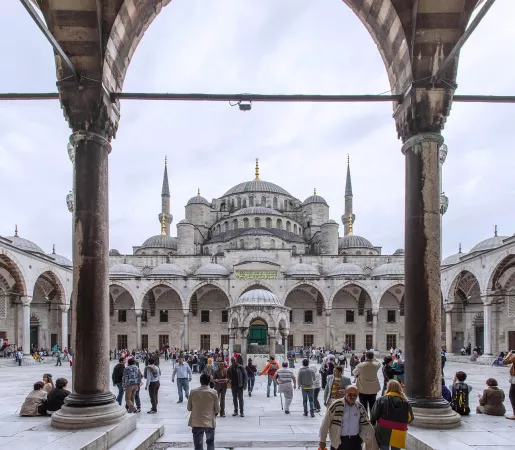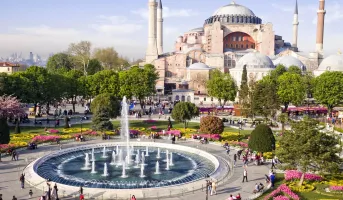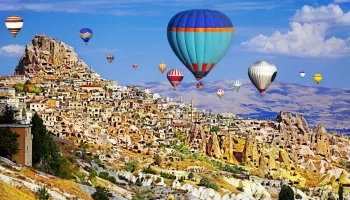
Turkey
Duration
7 to 14 Days
7 to 14 Days
Theme
Hill Station, Heritage
Hill Station, Heritage
Turkey Travel Guide
Turkey, located at the crossroads of Europe and Asia, boasts a rich historical and cultural heritage. With a diverse landscape that includes stunning beaches, bustling cities, and ancient ruins, Turkey is famous for its unique blend of East and West. The country's historical significance as the former center of the Byzantine and Ottoman Empires adds to its allure, attracting visitors from around the world.
Top Attractions in Turkey
- Explore the ancient city of Ephesus
- Marvel at the natural wonder of Cappadocia's fairy chimneys
- Visit the Blue Mosque in Istanbul
- Relax on the beautiful beaches of Antalya
- Experience the hot air balloon rides in Pamukkale
Turkey is Famous for
Its rich historical sites and stunning natural landscapes.Top Attractions in Turkey
- Exploring the underground cities of Cappadocia
- Indulging in the vibrant bazaars of Istanbul
- Relaxing in the thermal pools of Pamukkale
- Discovering the ancient ruins of Troy
- Cruising along the Turquoise Coast
What's Great about Travelling to Turkey?
- Rich history and culture to explore
- Diverse landscapes offering something for every traveler
- Warm hospitality of the Turkish people
- Delicious cuisine blending flavors from East and West
What's Not So Great about Travelling to Turkey?
- Some areas may be crowded with tourists
- Language barrier in remote areas
- Occasional political unrest in certain regions
- High tourist season prices
Travel Tips for Turkey
- Check visa requirements before traveling
- Use public transportation in cities for convenience
- Respect local customs and traditions
- Be cautious of street vendors and pickpockets
Important Turkey trip information
- Ideal Duration: 10-14 days to explore major attractions
- Best Time to Visit: Spring (April-May) and Fall (September-October) for pleasant weather
- Nearby Airports and Railway Stations: Istanbul Airport, Ankara Esenboga Airport, Istanbul Sirkeci Terminal
Top 7 Places to visit in Turkey
Per Person
60,950
*EXCLUDING APPLICABLE TAXES 5.0 Ratings
( 105 Reviews )
( 105 Reviews )
Per Person
1,93,750
*EXCLUDING APPLICABLE TAXES 5.0 Ratings
( 25 Reviews )
( 25 Reviews )
Per Person
60,950
*EXCLUDING APPLICABLE TAXES 4.9 Ratings
( 346 Reviews )
( 346 Reviews )
Per Person
32,475
*EXCLUDING APPLICABLE TAXES 4.9 Ratings
( 346 Reviews )
( 346 Reviews )
Total
4,04,000
*EXCLUDING APPLICABLE TAXES 5.0 Ratings
( 25 Reviews )
( 25 Reviews )
Per Person
69,999
*EXCLUDING APPLICABLE TAXES 5.0 Ratings
( 58 Reviews )
( 58 Reviews )
FAQ's on Turkey
Q1: What is the best time to visit Turkey?
The best time to visit Turkey is during the spring (April to June) and autumn (September to November) when the weather is mild, and tourist crowds are smaller. Avoid the peak summer months of July and August, as it can get very hot. Winter (December to February) is ideal for those interested in skiing in places like Uludağ or Palandöken. Various events and festivals also take place throughout the year, so check for specific dates if you want to experience them.
Q2: Do I need a visa to travel to Turkey?
Most tourists need a visa to enter Turkey, which can be obtained online through the e-Visa system. Some nationalities are exempt from visa requirements for short stays. Make sure to check the current visa regulations and any special conditions based on your country of origin before traveling.
Q3: What are the must-visit attractions in Turkey?
Turkey is rich in historical and natural wonders. Top attractions include the Hagia Sophia and Blue Mosque in Istanbul, the ruins of Ephesus, the fairy chimneys in Cappadocia, Pamukkale's thermal pools, and the ancient city of Troy. Don't miss out on experiencing a traditional Turkish bath (hamam) and exploring the vibrant bazaars.
Q4: Is Turkey a safe place to travel?
Turkey is generally a safe country for tourists. However, it's advisable to avoid the southeastern border areas due to occasional unrest. Practice common safety precautions like being aware of your surroundings, avoiding demonstrations, and taking care of your belongings, especially in crowded tourist areas.
Q5: What is the local currency in Turkey and can I use credit cards?
The local currency in Turkey is the Turkish Lira (TRY). While credit cards are widely accepted in major cities and tourist destinations, it's recommended to carry some cash for smaller shops and local markets. ATMs are readily available in urban areas for convenient currency exchange.
Q6: What is the local cuisine like in Turkey?
Turkish cuisine is diverse and flavorful, with dishes like kebabs, mezes, baklava, and Turkish delight being popular choices. Don't miss trying traditional dishes like köfte (meatballs), gözleme (stuffed flatbread), and çay (Turkish tea). Vegetarians will also find plenty of options, including stuffed peppers and eggplant dishes.
Q7: What transportation options are available in Turkey?
Turkey has a well-developed transportation network, including buses, trains, domestic flights, and dolmuş (shared taxis). In cities like Istanbul, you can use trams, metros, and ferries for convenient travel. Renting a car is also a good option for exploring the country's scenic routes at your own pace.
Q8: Are there any cultural norms or etiquette I should be aware of when visiting Turkey?
When visiting Turkey, it's important to respect local customs and etiquette. Dress modestly when visiting religious sites, greet people with a handshake, and remove your shoes before entering someone's home. It's customary to bargain in markets, and showing respect for elders is highly valued in Turkish culture. Remember to say "teşekkür ederim" (thank you) as a sign of gratitude.
Q9: I am a travel agent. How can I buy travel leads of Turkey?
Register yourself as a travel agent at agents.tripclap.com and then you can buy travel leads to Turkey once your account is approved. For more details contact our support team at +91-8069186564 or support@tripclap.com












